Keith R.Anderson & Randy D. Reese
Foreword by James M. Houston




With gratitude always to my mother, Bertha Marion Li jedahlAnderson, my first mentor and my best
Keith
To Susan, my partner for the journey, proof that God shed his grace on me
Randy
Foreword
We are living in a period of disenchantment with "knowledge for knowledge's sake." Certainly in theology we desire that knowledge should be for God's sake, or indeed to help us become more godly. This work, by two experienced pastoral teachers, establishes the nature and practice of spiritual mentoring on a sound theological basis. For Jesus Christ is the mentor par excellence. His life and his words are one-transformative indeed!
Rightly it is observed that the basis of New Testament teaching is the requirement of a "heart relationship" that is much more than mere information. We must have an open heart before God. This then opens us to infinite desires that only God can satisfy, as Augustine describes to us in his Confessions. Yet we also join in the communion of saints, a companionship through rich historical traditions, of those who have been "the friends of God."
The core conviction of this book is clear: that Christian spiritual formation, unlike other religious forms, is a personal reality grounded in the triune God of grace. It can be delegated only to disciples of Jesus who walk alongside other, perhaps less mature, followers of Christ. Books may help-otherwise this one would not have been written! But this book is to be discussed personally rather than merely read in isolation. For spiritual mentors matter most when the spiritual life is centered upon spiritual friendships. Read then this excellent book to become a wiser mentor of others, and read it to know what kind of person will help you most to become a more intimate friend of God.
The practicability of this book is simple yet deeply communicated. Living in the light of God's love, his divine personalness, requires us to grow in basic trust or faith-so central to the biblical message-as well as intimacy, the spirit of docility, responsiveness to divine grace, accountability and all else that we mean by biblical "righteousness." Then we shall enjoy what the Puritan divine Robert Bolton called "having a comfortable walk with God."
Reader, you are invited then in this book to enter into a deeper walk with God, as a sinner justified freely by his grace, to enjoy a fresh, living compan ionship in spiritual mentoring. If you bemoan the absence of a spiritual mentor in your life, then be one! This book will help you be what you long to have. It is to be more godly, more Christlike.
James M. Houston
Preface
This book emerged from conversations between the two authors as we shared our lives as spiritual mentors, Randy at North American Baptist Seminary, Sioux Falls, South Dakota, and Keith at Bethel College, St. Paul, Minnesota. We discovered a convergence of thinking and practice in our various responsibilities that drew us back to the writings of some of church history's great teachers and writers.
We have started the book with a descriptive outline of the book you hold in your hands. The Anderson/Reese Model of Spiritual Mentoring summarizes the teachings we have discovered through our own work and research and through the suggestive ideas of J. Robert Clinton, professor of leadership, School of World Mission, Fuller Theological Seminary, Pasadena, California.
The greatest value of this book, however, will be to return to this outline after you have spent time immersing yourself in the writing and histories of our guest list of classic spiritual writers. We hope this work provides a larger audience of readers an entree to some of their writings.
We are grateful to Dr. James Houston, former professor and chancellor of Regent College, Vancouver, British Columbia, for his kind encouragement and willingness to offer a profound foreword to this work.
Dr. Richard Sherry, an academic dean at Bethel College, carefully read and edited much of the grammar in several drafts of the work. Any other grammatical errors belong to the authors alone.
Randy's colleagues and students at North American Baptist Seminary helped shape the work by cheering encouragement, by reflecting critically over many cups of coffee and by allowing timely space for Randy to focus on the research and writing. Keith's mentors and students at Bethel College have touched his life as they have given grace and spoken truth to him.
The Anderson/Reese Model of Spiritual Mentoring

Movements in the Spiritual Mentoring Process

One
An Imitative Faith
He that followeth me walketh not in darkness, saith the Lord. These are the words of Christ, whereby we are admonished how we must imitate His life and conversation if we would be truly enlightened and delivered from all blindness of heart.t
THOMAS A KEMPIS
 hristian faith is an imitative faith. It always has been. Beginning with Jesus' earliest words to the men and women who would become his apprentices of faith, Christianity has understood itself to be a faith taught by one to another. The life of Jesus Christ must be seen and held as the unique model worthy of imitation for Christians. "Jesus, then, is always the attractive source and challenging exemplar for Christian spirituality."2
hristian faith is an imitative faith. It always has been. Beginning with Jesus' earliest words to the men and women who would become his apprentices of faith, Christianity has understood itself to be a faith taught by one to another. The life of Jesus Christ must be seen and held as the unique model worthy of imitation for Christians. "Jesus, then, is always the attractive source and challenging exemplar for Christian spirituality."2
"Follow me" may be the simplest description of Christian spirituality that exists anywhere, but the simplicity is deceptive. This simple command assumes a complex relationship through which one becomes educated for the reign of God.
That Jesus was a teacher in a world familiar with the relationship of rabbi and disciple is well documented. That Jesus was a "discipler" of others is also well understood. That Jesus intended a similar strategy for spiritual mentoring for the church is fiuther enunciated in what is called "the Great Commission," in which it is dear that all disciples are intended to become teachers of faith to the nations:

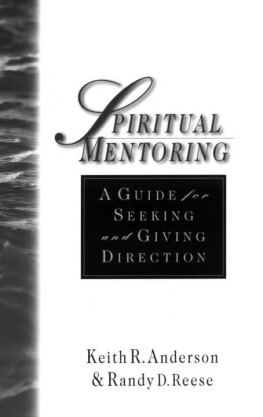

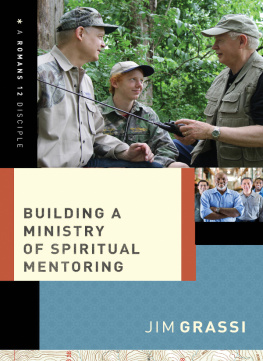


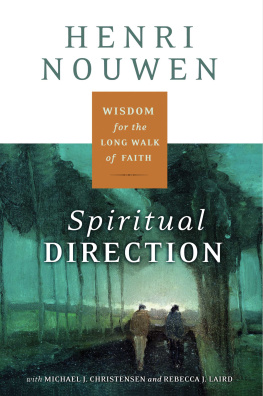
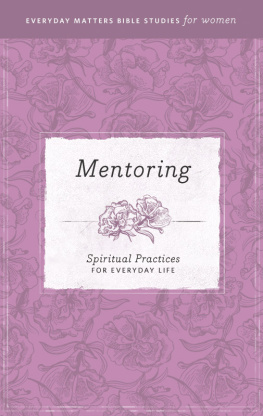
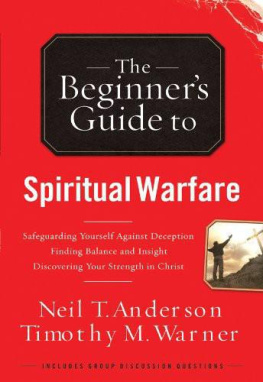










 hristian faith is an imitative faith. It always has been. Beginning with Jesus' earliest words to the men and women who would become his apprentices of faith, Christianity has understood itself to be a faith taught by one to another. The life of Jesus Christ must be seen and held as the unique model worthy of imitation for Christians. "Jesus, then, is always the attractive source and challenging exemplar for Christian spirituality."2
hristian faith is an imitative faith. It always has been. Beginning with Jesus' earliest words to the men and women who would become his apprentices of faith, Christianity has understood itself to be a faith taught by one to another. The life of Jesus Christ must be seen and held as the unique model worthy of imitation for Christians. "Jesus, then, is always the attractive source and challenging exemplar for Christian spirituality."2